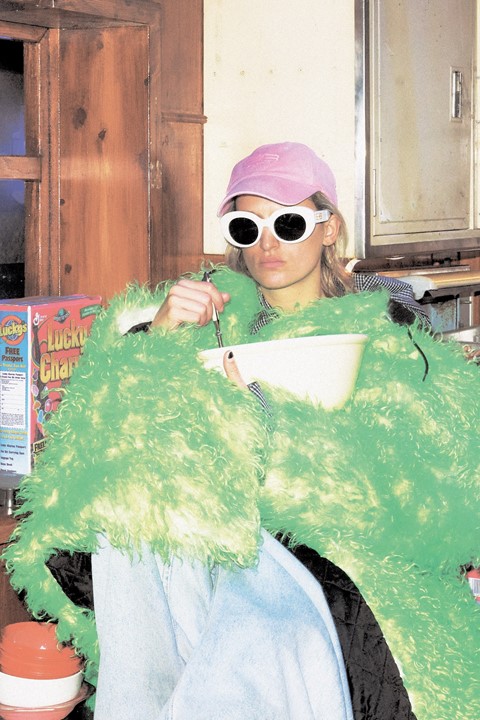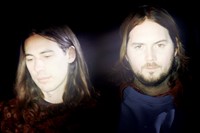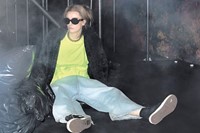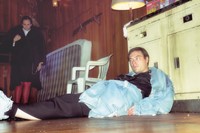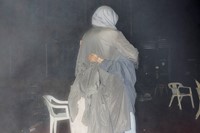Oliver Leith and Matt Copson’s unorthodox opera draws from Gus Van Sant’s Kurt Cobain biopic, and features overblown costumes by Balenciaga and music from Caroline Polachek
Oliver Leith and Matt Copson’s opera Last Days is adapted from Gus Van Sant’s 2005 film based on the days that pre-empted Kurt Cobain’s suicide. However, their aim is not to re-tell the story of the grunge icon. Instead, they intend to challenge expectations. “If you come for an opera with Kurt Cobain and Nirvana, you’ll be extremely fucking disappointed,” Leith says. They distort the telling of the now-canonical story with ethereal sound, abstracting the narrative into a thrillingly subversive opera running for five nights at London’s Royal Opera House.
Last Days interweaves art, music, fashion and film to create a truly contemporary moment within opera, a traditionally archaic form. Costuming, created in collaboration with Balenciaga, is both a first for the brand and the theatre. While the backdrop is a painting by Copson, inspired by the work of Max Ernst and John Martin, a neon re-imagining of the forest in Van Sant’s film. The lead role is played by French actor Agathe Rousselle and the singer Caroline Polachek, Copson’s partner, has contributed an aria, released to time with the first performance.
Leith, currently composer-in-residence at the Royal Opera House, was introduced to Copson through their mutual friend, music producer Danny L Harle. They immediately connected, sharing an interest in “high theatricality with absolute banality intermixed”. Leith composed the score to the libretto – the text of an opera – which Copson wrote. Copson, a visual artist, is also directing. This isn’t the norm for creating an opera, they explain; neither are experts and the pair are familiarising themselves with operatic tradition as they go. But then again, most of the elements of Last Days also move against convention.
For one, Rousselle does not sing in the lead role; rather, Blake (the proxy character for Cobain invented by Van Sant) mumbles. She relies on the impact of her body instead. “We wanted someone that felt feral,” says Copson of the lead actor. Anyone who’s seen Rousselle’s turn in body horror film Titane, which won the Palme d’Or at the 2021 Cannes Film Festival, will know what he means. “It was important to me to have someone who didn’t sing,” says Leith, “to increase the isolation. It raises the more ridiculous question, why the fuck is everything singing?” Onstage, as well as the cast of singers, a telephone rings and a kettle shrieks, adding to the clamour of sound.
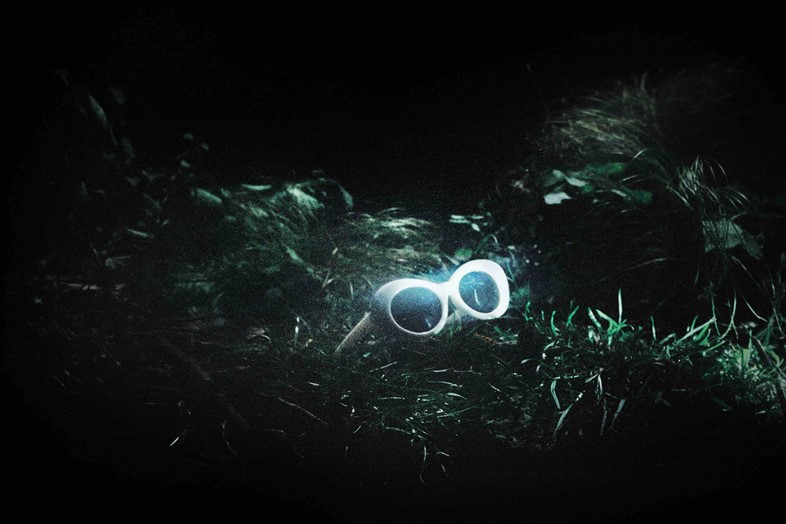
Balenciaga’s costumes are also not quite costumes but garments selected from recent collections, which develop the look of the piece into overblown realism. A veritable motley crew of roles – groundskeeper, Mormon-turned-party-goers, DHL courier – don shredded denim, XXL logo hoodies and even a floor-length duvet coat in a shape that references Cristóbal Balenciaga’s original designs. “Demna oversees everything that’s been on the stage here. It was a really good in-depth conversation. They’re interested in archetypes – the 90s, degradation and irony – so it made total sense.” Ultimately, Leith and Copson explain, it doesn’t really matter whether Rousselle is playing Cobain or Blake or anyone. She’s portraying an idea, an archetype, a character embedded in our collective cognisance. “There’s a cultural lineage that starts with a figure like Kurt Cobain, and has been disseminated through all kinds of media – tabloids at the time, then into this cult film,” says Copson. “It’s a mythology that has been created. Our idea of Cobain is infused with something like Last Days – that has heightened the iconography of [him]. Primark making smiley face Nirvana T-shirts has done the same.”
Nonetheless, taking someone’s story and telling it through art is a complex thing, so biographical details often need to be abstracted. Van Sant’s film takes this approach, one which has continued into Copson and Leith’s process. “Gus wasn’t precious, he sent us the script – one page on Microsoft Word – and said, do whatever you like.”
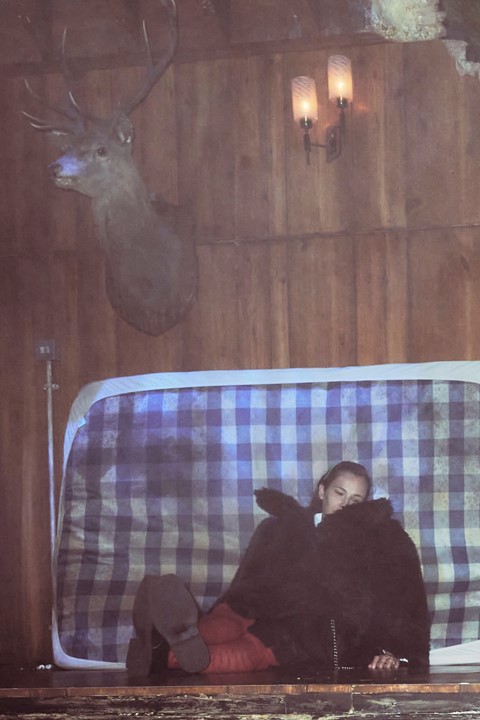
“Effect is the most important thing – how should this opera make someone feel?” Copson says. “You’re gonna get dragged through, man,” Leith responds, grinning. “I mean, it’s everything. Scary. Lovely. Bittersweet. Horrible. Beautiful. For an hour and a half.” Crucially, it is the knowledge of the death of the central character that is the most important element to the tragedy. “The stakes of everything are heightened by [that] knowledge. If someone takes a sip of water, it’s a sip of water and they’re about to die, so it becomes an interesting sip of water,” Copson says. This awareness permeates the experience of watching Last Days, right up until the final minutes.
In the opera’s third act, the aria performed by Caroline Polachek rings out through a record player. Sung in Italian, as the form usually requires, Polachek’s otherworldly voice stretches to operatic heights composed for her by Leith. The lyrics were written by Copson in Italian “via the medium of Google Translate,” he confesses. “I heard once you should never write a song that you wouldn’t sing to someone on their deathbed,” says Polachek, “but that’s bullshit. There’s a time for everything, although sometimes not enough. Oliver asked me what the highest note I can sing is. But even up on a high F#, skull resonating past the point of cogent thought, my breath is finite, it cannot be sustained. We all know how it ends, just not when.”
Last Days is playing at the Royal Opera House from 7 - 11 October 2022.
